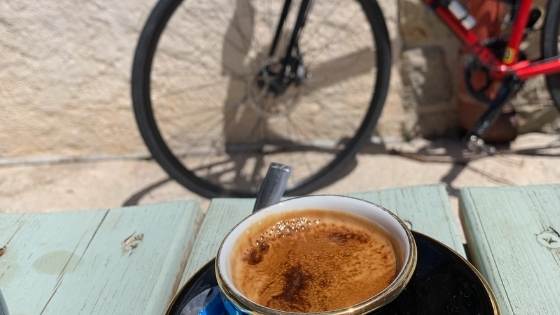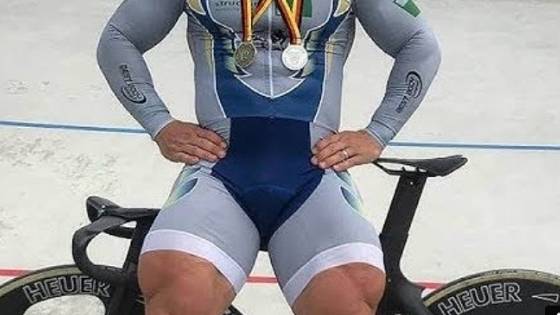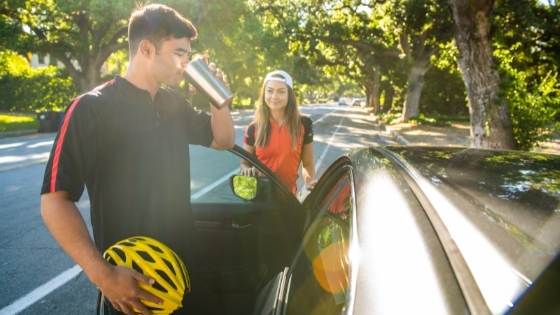
Coffee is one of the most studied and drunk beverages globally, and the majority of us consume 3 to 4 cups daily.
But can you drink coffee before a bike ride?
Is it safe, and are there any benefits to drinking a cup of coffee before heading out on a bike ride?
The research into the effects of coffee on endurance performance is extensive, and experts have unanimously decided that coffee can be consumed before cycling. Drinking 1 to 3 cups of coffee 1 hour before cycling your bike is recommended by several studies. Coffee gives you a boost of energy, increases strength and burns more fat.
Therefore, drinking coffee is very beneficial before heading out the door on your commute to work or cycle ride.
The best thing about coffee is it’s the most studied drink in the world, and it has proven to give us many health advantages.
Caffeine, antioxidants, nutrients and minerals, and calorie-free make it the perfect drink before any endurance sport.
Table of Contents
How Long Before Cycling Should I Drink Coffee?
In general, most studies recommend drinking coffee approximately 1 hour before your bike ride. The full effects of coffee remain in your system for 1 hour. Half the caffeine will stay in your system 6 hours after drinking your first cup of coffee.
Drinking your coffee 1 hour before cycling gives your body time to wake up and focus on your bike ride.
Your body begins to use the caffeine and other ingredients straight away, but you are allowing the benefits of the caffeine to start working. Use this time to stretch, focus and relax before your big ride.

How Much Coffee Can I Drink Before Cycling?
Typically, 1 to 3 cups of coffee (150mg – 300mg of caffeine) will provide you with the most benefits for cycling. A 16oz cup of coffee contains 150mg of caffeine. Drinking more than 400mg of caffeine (5 cups of coffee) in one day isn’t recommended.
Unfortunately, it is difficult to accurately calculate how much caffeine is in a cup of coffee.
Many factors contribute to the volume of caffeine within the coffee, including coffee beans, brewing methods, water, etc.
The most reliable technique to monitor caffeine intake is by utilising a supplement or caffeine powder.
That way, you know the exact quantity of caffeine in each serving.
Although calculating the amount of caffeine is more accessible in supplements and pre-workout drinks, you don’t experience the many health benefits coffee brings you.
I regularly brew a 16oz coffee, which provides me with all the benefits, and it supplies me the right volume of energy and concentration for my bike ride.
6 Benefits Of Drinking Coffee Before A Bike Ride

1. Enhanced Energy Focus and Alertness
The caffeine in your coffee is the power inside your cup of joe.
When you feel sleepy or tired, it’s actually the build-up of adenosine within your brain. When we wake up feeling groggy and tired, cycling is the furthest thought from our minds.
Caffeine replaces the adenosine, and your brain becomes more alert and focused, instantly boosting your energy levels.
The next stage in the caffeine story is the release of adrenaline which is excellent for cycling.
The adrenaline gets your heart pumping and begins to open up your airways and circulation system.
Our bodies natural response to adrenaline is to deliver dopamine, and we get excited and motivated to ride our bikes.
The combination of alertness, focus and energy makes coffee the ideal pre-workout drink before any bike ride.
Furthermore, the full effects of coffee remain in your system for 1 hour, giving you plenty of time to benefit from its power.
In fact, half the caffeine will stay in your system 6 hours after drinking your cup of coffee.

2. Increases Leg Strenght
Studies revealed that drinking around 3 cups of coffee, approximately 300mg of caffeine, increases muscle strength.
And because your glutes, legs and core are the biggest muscles in your body, it’s great news for cyclists.
It’s because your central nervous system is highly stimulated, enhancing blood flow, hormone production and firing your muscle fibres.
Therefore, you could benefit from this research by using three cups of coffee on your more challenging cycling days.
Receive the extra muscle strength to get up that difficult slope or for a longer ride.
However, before you get really excited about the news, the research did discover it only increased muscle strength by 1-2% on average.
And the higher amount of caffeine could have an impact on your long term health.
Although 300mg is within the safe amount of caffeine for one day, it’s probably not recommended to drink that amount at once.
3. Boosts Endurance
Technically the caffeine within our coffee is known as a performance-enhancing supplement.
Even though scientists have determined the effects of caffeine, it isn’t banned in any sport.
One of its noteworthy enhancements is on your endurance and can increase overall output by 5%.
When you drink your cup of coffee, the caffeine boosts nitric oxide levels, which is essential for endurance.
Nitric oxide relaxes the inner muscles of the blood vessels, causing them to widen and increase circulation.
Therefore, the wider the blood vessels, the more blood passes through your body into your muscles, meaning more oxygen and nutrients.
It’s like a two-hit process coffee boosts nitric oxide, and so does exercise. The longer and harder you cycle, the higher nitric oxide levels build, making performance improved.

4. Burns More Fat
During regular cycling training, your body will burn its store of glucose as your primary source of energy.
The body will always use its store of glucose instead of switching to fat as an energy source. Only when your storage of glucose is gone will it turn to fat to provide your energy.
Which could mean cycling for 2 or 3 hours to get into a fat-burning zone.
But coffee does amazing things to your body and actually increases the likelihood of your body burning fat during your bike ride.
The caffeine inside your coffee blocks cells that only burns glucose and allows the body to use fat as an energy source.
Meaning, when you drink coffee before your ride, you’re burning both fat and glucose simultaneously.
This is great for two reasons.
First, you’re burning more fat earlier, so you don’t have to cycle for hours to get into your fat-burning zones.
Secondly, because you’re not using all your glycogen levels first, you have additional glucose storage to boost your performance when you get to the challenging section of your ride.
Another great way to promote fat loss is using intermitted fasting, and to find out more, check out this article.

5. Prolongs Muscle Soreness
Fatigue, cramp and sore legs are the worst responses from your body when you have been cycling for a few hours.
The knowledge you don’t have anything left to give is the reason why you will cut your bike ride short. But coffee could delay the onset of muscle soreness, instantly increasing your time in the saddle.
Caffeine is an excellent neuro stimulant, and its benefits to increase mental and cognitive functions are well studied.
Caffeine helps block the signals from your muscles to the brain. It suggests your muscle can work harder without telling the brain to stop.
Because the caffeine slows the signs reaching your brain, you can push harder before the muscle gets sore.
However, this is very short-lived, and you won’t be able to push your muscles for hours without your brain noticing your muscles are burning.
Yet, the slight increase could be enough to cycle a challenging hill or push out an extra few miles after a long ride.
6. Helps You Poop
If you like to cycle your bike first thing in the morning, the last thing you need is your ride to be interrupted by a bathroom break.
Even worse, the fact that there probably isn’t anywhere suitable to stop and poop.
Therefore, a cup of coffee 1 hour before your bike ride can really help get things moving.
The reason why coffee makes some of us want to dash to the bathroom has been heavily researched, but scientists still don’t know why this occurs.
There are a lot of theories, but the fact is still actual that it simulates the need to poop within 20 mins of consuming your brew.
Indicting, if you don’t need to stop, then you can cycle further and with less weight.



